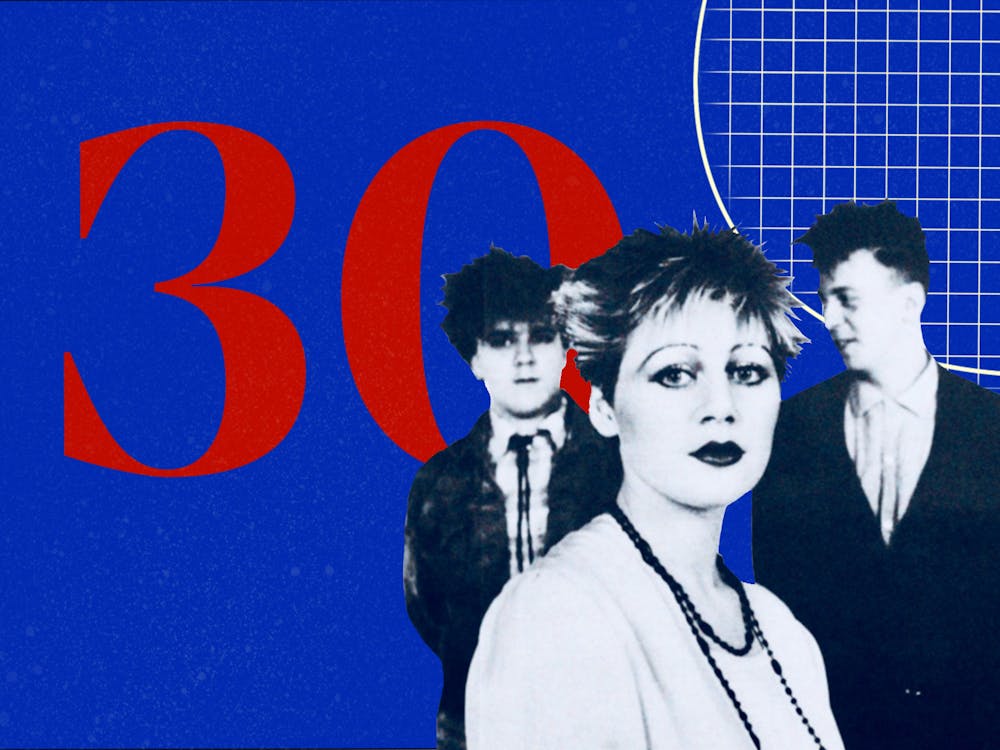On Sept. 17, 1990, the Cocteau Twins released their sixth studio album, Heaven or Las Vegas. 30 years later, this collection of intricately–woven dreamscapes remains as innovative as ever. From Elizabeth Fraser's stunning–yet–unintelligible vocals to Robin Guthrie's transportive guitar work and Simon Raymonde's buttery bass, Heaven or Las Vegas' beauty has been a constant reference for many bands since its release. The trio's psychedelic, dreamy, all–encompassing style have influenced woozy bands like Beach House to heavier bands like Slowdive and Ride. Similarly, Heaven or Las Vegas remains as significant now as it was when it was released three decades ago.
Fraser's vocal performance is transcendently alien; she elevates the record to an astral plane of its own. Fraser is mixed so perfectly into the production that she feels like an instrument of pure human emotion rather than a traditional vocalist. Her tendency is to focus on how words sound and feel, their rhythm, pitch and tonality—not on an interpretable pronunciation. Overlapping vocals, like on "I Wear Your Ring," aren't bogged down by the need to understand and untangle what's being sung. The rhythms, cadences, and harmonies fit together; here, there's no need for words to communicate feelings. Occasionally, when the lyrics are understandable, like on album opener "Cherry–colored Funk," they're richly descriptive: "And should I be hugged and tugged down through / This tiger's masque?", Fraser pleads on the song's rawest moment.
The only artist that can be compared to Fraser is Sigur Rós' Jónsi, who sings in English, Icelandic, and Vonlenska, a made–up language with no apparent meaning or consistency. Both singers' vocals help their bands fly to new heights, despite not being immediately accessible to the majority of English–speaking audiences. Recently, Jónsi and Fraser have released a collaboration, "Cannibal," to be featured on Jónsi's upcoming album, Shiver. Fraser's work with Massive Attack, too, is significant; she helped create some of the trip–hop juggernaut's biggest hits, including "Teardrop" and "Black Milk."
Guthrie's jangly, reverberated guitar work throughout the album makes the music sparkle and shine with the impressive luminescence of the album's titular strip. The fog of noise he builds throughout every song is incredibly dense but never oppressive, and the melodic guitar lines are able to glow through this mist like neon signs cut through night haze. Beyond the flashy, enrapturing solos on tracks like "Fotzepolitic," the melodies he builds are gripping, and absolutely ethereal. The vibe on songs like "Iceblink Luck" is instantly ecstatic thanks to the dynamic between Fraser's vocals and Guthrie's guitar work.
The bass work, performed by Simon Raymonde, is constantly engaging and evocative. The sharp basslines are incredibly versatile, carrying a swagger that combines the intensity of post–punk with the grooviness of funk while (like Guthrie and Fraser) contributing to the dreamy, expressive collage of sounds. "Fifty–fifty Clown" features a driving, monotonous bassline—almost like something from a Joy Division album—that imbues the track with a rebellious air. But the riffs on "Iceblink Luck" are quite danceable, and the layers of noise on "Heaven or Las Vegas" help create the track's rich, comforting sound.
The legacy of Heaven or Las Vegas cannot be understated. Often credited as a landmark album in the dream pop genre, the Cocteau Twins took the highly textured sounds of artists like My Bloody Valentine and the Jesus and Mary Chain, and softened the harsher edges, leading to the signature ethereal vibe that permeates every aspect of the record. They even took influence from groups out of Phil Spector's Brill Building in the 1950s and 1960s. Guthrie explained in one interview that “the aim was to make music with punk’s energy but more finesse and beauty, and that shiny, Phil Spector sound."
The groups they have influenced are similarly wide–ranging. Slowdive's Souvlaki carries an airy, dreamy quality, and more recently, Beach House's 7 was full of the thick, almost ambient sheets of sound that make Heaven or Las Vegas so stunning. In one interview, Raymonde pointed out the comparisons between Fraser and Victoria Legrand, the lead singer, songwriter, and keyboardist for Beach House. "I see the way people look at Victoria. It's like I'm revisiting what it was like to see a sea of thousands of faces look at Elizabeth [Fraser], just madly in love with her ... I think it's really emotional, [Beach House's] music. I can't say I ever felt that about our own music. I never cried at our own music, listening back to it, unless I was so frustrated because I couldn't make it sound how I wanted to make it sound. I know that other people did find our music very emotional. Now I kind of understand that better."
Beyond Slowdive, Beach House, and the plethora of dream pop bands that have inevitably been inspired by the Cocteau Twins, even artists like The Weeknd have paid homage to Heaven or Las Vegas.
Aside from all the technical jargon about innovation and legacy, Heaven or Las Vegas is one of the most beautiful rock albums to exist. From the transcendent highs of the title track and "Iceblink Luck" to the moody, atmospheric aura of "Frou–frou Foxes in Midsummer Fires," every aspect of this album is deeply engrossing and darkly gorgeous. Despite being released thirty years ago, Heaven or Las Vegas' versatility, mystique, and innovation make this album feel as tangible and real as a lucid dream.

